December 2, 2014
Edited by David Sanders
Specimen Days
1868 – Francis Jammes, French poet/writer (Jammisme), is born.
1918 – Edmond Rostand, French poet and dramatist (b. 1868), dies.
1985 – Philip Larkin, [hermit of Hull], English poet, dies at 63.
2004 – Mona Van Duyn, American poet (b. 1921), dies.
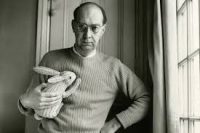
Days
What are days for?
Days are where we live.
They come, they wake us
Time and time over.
They are to be happy in:
Where can we live but days?
Ah, solving that question
Brings the priest and the doctor
In their long coats
Running over the fields.
—Philip Larkin (1922–1985)
What are days for?
Days are where we live.
They come, they wake us
Time and time over.
—Philip Larkin (1922–1985)
World Poetry
Time Is Running Out for Campaign to Buy William Blake’s Home

Time is running out to save the Sussex cottage where William Blake wrote of the dark satanic mills and green and pleasant land of England in his most famous poem Jerusalem, with the Blake Society still more than £400,000 short of the total required to buy the house for public use.
Thai Police Detain Students for Scattering Anti-Authority Poem
Thai police detained at least six students at a Bangkok university for distributing leaflets with an anti-authoritarian poem, a student activist said. The students scattered the leaflets on the campus of Thammasat University today to mark the re-emergence of a professor who had gone into hiding after Thailand’s army staged a coup in May, said Rattaphol Supasopon, a student activist with the League of Liberal Thammasat for Democracy group. The poem was posted on the Facebook page of the professor, Somsak Jeamteerasakul, Rattaphol said.
Leading and Controversial Lebanese Poet Saeed Akl Dies at 102
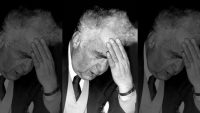
Lebanon's state-run news agency says Saeed Akl, Lebanon's leading poet whose fame once spread throughout the Arab world, has died. He was 102. The ultra-nationalist Akl wrote his poems in classical Arabic as well as Lebanese dialect which he used to refer to as "the Lebanese language."
Time is running out to save William Blake’s Sussex cottage.
Recent Reviews
Verses of Note: The Best Poetry of 2014
by Michael Robbins
Most of this year's high-profile poetry titles slid right off my eyeballs. Plus ça change. The New Yorker and The New York Times Book Review regularly ignore exciting books like Robyn Schiff's "Revolver" and (my friend) Anthony Madrid's "I Am Your Slave Now Do What I Say," but heaven forfend they allow a single Louise Glück collection to go unreviewed.
The Surprisingly Erotic Poetry of Bertolt Brecht
By William Giraldi
Think of Bertolt Brecht and you do not think of Eros. A fervent Marxist playwright with a handful of masterworks—Drums in the Night, The Threepenny Opera, Mother Courage and Her Children, Life of Galileo, The Good Person of Szechwan—Brecht was also the most revolutionary drama theorist of the twentieth century. His misnamed “epic theater” posited a smashing of theater’s fourth wall and a dispelling of the emotional abracadabra drama casts over its audience. A round-the-clock communist for whom literature was the manifestation of socio-historical pressures, Brecht believed that art should function as the instigation for revolt. Art must be useful, must serve the gritty aims of practicality. No self-important prettiness, no “willing suspension of disbelief,” no Aristotelian catharsis. Brecht would rather you not be so bourgeois as to feel anything; instead, think about what you’re seeing and then go depose your tranquilized leaders.
The Sun King by Conor O’Callaghan
by Magdalena Kay
Conor O’Callaghan’s The Sun King is a rich volume that immediately stuns the reader with its seamless interweaving of a contemporary idiom—the language of here and now—with a lyricism that reaches us through strata of literary history. O’Callaghan is capable of combining high and low registers in a way that very few writers are, seemingly without strain.
The Infinitesimals
by Ellen Duffer
Imagine a strange land where tumors that resemble “terrible frogs,” a man with an “unbuttoned” face, and an ever-returning sea beast dwell, and where motherhood is a “grand opera staged in a cave.” This isThe Infinitesimals by author Laura Kasischke, her ninth poetry collection (in addition to nine novels), which was published by Copper Canyon Press (July 2014). Here, illness and mortality assume anthropomorphic contours, wherein the loss of Kasischke’s mother, for instance, becomes “birds on the other side of . . . binoculars” who stare her (and us) down.
Brecht believed that art should function as the instigation for revolt. Art must be useful, must serve the gritty aims of practicality. No self-important prettiness, no “willing suspension of disbelief,” no Aristotelian catharsis.
Broadsides
Clearings, Iceholes, Other Abodes: Dorothea Grünzweig

by Derk Wynan
The way that jets, tempests, or fireworks, captured on paper by an adult child I know, get the fear of them off his back, arrest it—so do the words of poetry act as detention centres, repositories into which fear is thrust, to serve time there. So if the adult child is distraught, one needs to recite poems to him, make up melodies in which they are wrapped and sing them. He sings along, grows calm, just as he grows calm after wild, erratic joy once the joyrousers slip into small shapes on the page, or laugh out and beckon from a poem.
The Poetry of Edward Thomas
by Craig Raine
What accounts for the enduring charm of ‘Adlestrop’? ‘Yes. I remember Adlestrop.’ The first word of the first line is crucial in its unexpectedness. Is there another poem in the English language that begins so? Keats’s ‘Ode on Melancholy’: ‘No, no, go not to Lethe.’ A little run of pleading repetition, quite different from Thomas’s monosyllable. ‘Yes’. It is an unattached affirmation. Sealed off by a full-stop. It establishes a dialogue with exemplary economy. It is an answer to a question about memory, and the nature of memory, as much as about place. Without that ‘yes’, the first line would be about place only.
So if the adult child is distraught, one needs to recite poems to him, make up melodies in which they are wrapped and sing them.
Drafts & Fragments
Clive James Left Red-faced by Autumn Poem Prediction

by Roger Maynard
The writer and broadcaster, who in his last poem published earlier this year, forecast that he would be dead by autumn, says he's embarrassed that he is still here. Interviewed on Australian radio, James agreed it was a problem "I haven't croaked at all." In his poem Japanese Maple, he revealed he wanted to live until the maple tree's leaves turned to flame.
Clive James, who in his last poem published earlier this year, forecast that he would be dead by autumn, says he’s embarrassed that he is still here.
Poetry In the News
Mark Strand, 80, Dies; Pulitzer-Winning Poet Laureate
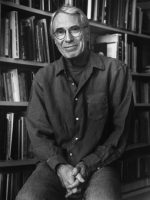
Mark Strand, whose spare, deceptively simple investigations of rootlessness, alienation and the ineffable strangeness of life made him one of America’s most hauntingly meditative poets, died on Saturday at his daughter’s apartment in Brooklyn. He was 80.
Allan Kornblum, Independent Publisher, Dies at 65
Allan Kornblum, whose love for poetry and printing led him to create Coffee House Press, a leading independent publisher widely respected for finding and nurturing new authors, died on Sunday at his home in St. Paul. He was 65. His wife, Cinda, said the cause was complications of chronic lymphocytic leukemia. He learned he had the disease in 2006.
Seattle Poet Uses MacArthur Grant Money To Give Vacations To Exhausted Caregivers

Five years ago, Seattle poet Heather McHugh got some unexpected news: She had been awarded a MacArthur Foundation “Genius Grant” of $500,000. For the next two years, she tried to figure out what to do with the money. The grant comes with no strings attached, but McHugh says she didn’t want to spend it on herself.
Mark Strand died on Saturday at his daughter’s apartment in Brooklyn.
New Books
Life in a Box is a Pretty Life by Dawn Lundy Martin
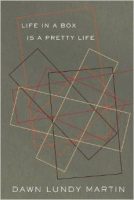
[Paperback] Nightboat, 80 pp., $15.95
Dawn Lundy Martin’s Life in a Box is a Pretty Life investigates the ways in which language claims absolute knowledge and draws a box around lived experience. Martin writes poems that seek out moments when the box buckles, or breaks, poems that suggest there is more. Life in a Box is a Pretty Life continues Martin's investigation into what is produced in the interstices between the body, experience, and language, and how alternative narratives can yield some other knowledge about what it means to be black (or female, or queer) in contemporary America.
Essays After Eighty Hardcover by Donald Hall
[Hardcover] Houghton Mifflin Harcourt, 144 pp., $22.00
Donald Hall has lived a remarkable life of letters, a career capped by a National Medal of the Arts, awarded by the president. Now, in the “unknown, unanticipated galaxy” of very old age, he is writing searching essays that startle, move, and delight. Most memorably, Hall writes about his enduring love affair with his ancestral Eagle Pond Farm and with the writing life that sustains him, every day: “Yesterday my first nap was at 9:30 a.m., but when I awoke I wrote again.”
Cup by Jeredith Merrin

[Paperback] Able Muse Press, 96 pp., $18.95
Jeredith Merrin’s third collection, Cup, deftly muses on art, travel to exotic locations, nature’s gains and losses, the resiliency of spirit juxtaposed against the body’s frailty, the joys and discords of the familial unit, and aging without bitterness and giving “Praise/ to her or him who keeps, past sixty/ and in all weathers . . . good-willed and willing// . . . but tired.” This collection of abundant wit, insight, longing and passion is deservedly a special honoree of the 2013 Able Muse Book Award.
Collected Poems by Michael Donaghy
[Paperback] Pan Macmillan, 272 pp., $24.95
The death of Michael Donaghy in 2004 at the age of 50 robbed poetry of one of its best-loved and most naturally gifted practitioners. A modern metaphysical, Donaghy wrote poetry of great wisdom, grace, charm, erudition, and consummate technical accomplishment. This book gathers together all of Donaghy's mature poetry, and includes the full texts of his four published volumes, as well as a number of fine uncollected pieces. As the poet-critic Sean O'Brien has remarked, Donaghy will come to be seen as one of the representative poets of the age.
Where Have You Been?: Selected Essays by Michael Hofmann
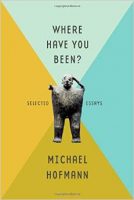
[Hardcover] Farrar, Straus and Giroux, 304 pp., $35.00
Michael Hofmann—poet, translator, and intellectual vagabond—has established himself as one of the keenest critics of contemporary literature. Safely nestled between the covers of Where Have You Been?, he offers a hand to guide us and an encouraging whisper in our ear, leading us on a trip through what to read, how to think, and why to like. And while these essays bear sharp insights that will help us revisit writers with a fresh eye, they are also a story of love between a reader and his treasured books.
Dawn Lundy Martin’s Life in a Box is a Pretty Life investigates the ways in which language claims absolute knowledge and draws a box around lived experience.
Correspondences
“They've all decided to try to starve me to death.”
by Kaveh Akbar
Franz Wright’s most recent works include F and Kindertotenwald. His collection Walking to Martha’s Vineyard was awarded the Pulitzer Prize in 2004, and he has also been the recipient of two National Endowment for the Arts grants, a Guggenheim Fellowship, and a Whiting Fellowship, among other honors. He and his father James Wright are the only parent/child pair to have won the Pulitzer Prize in the same category. Wright lives in Waltham, Massachusetts, with his wife, the translator and writer Elizabeth Oehlkers Wright.
A Ringing Echo: The Poetry of Caitlin Doyle
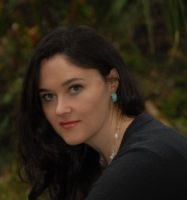
by Maya Sloan
Caitlin Doyle’s poems are not always what they appear to be, and this subtle shape-shifting quality is exactly what makes them so revelatory. As poet and critic Abriana Jette has written, Doyle’s work challenges “the belief that a poem that appears accessible of the surface is thus easy to comprehend… (her poems) always possess layers of complexity that reward multiple readings.” Whether using her inventive artistry to forge formal poetry or free verse, which she does with equal skill, Doyle creates poems that buzz with complicated nuances beneath their pared-down and haunting surfaces.
A Poetry Personal and Political

Claudia Rankine on ‘Citizen’ and Racial Politics
By Felicia R. Lee
A finalist for the National Book Award in poetry, Claudia Rankine’s “Citizen: An American Lyric” is audacious in form. But what is perhaps especially striking about the book is that it has achieved something that eludes much modern poetry: urgency. A finalist for the National Book Award in poetry, Claudia Rankine’s “Citizen: An American Lyric” is audacious in form. But what is perhaps especially striking about the book is that it has achieved something that eludes much modern poetry: urgency. “Citizen” is both insistently topical, with references to Trayvon Martin and stop-and-frisk police tactics, and concerned with intimate moments when racial impasses spring up between friends and colleagues.
An Interview with Mary Ruefle
by Rachel Abramowitz
Prior to the Wave Books reading on February 27th at this year’s AWP conference in Seattle, I had forgotten the depth of Mary Ruefle’s idiosyncrasies (Ruefle taught at the Iowa Writers’ Workshop during my time there). Sure, other poets may dress eccentrically or read their poems theatrically, but these external performances of artistic genius seemed contrived next to Ruefle’s genuine, no-nonsense nonsense. In Seattle, Ruefle took the stage carrying an antiquated hardback book and a large swath of ivory fabric. From the former she read one of her astonishing “erasure” poems (the book originally featured an oft-mentioned dog named “Loveliness” which after erasure became a lyrical horizon note). The latter turned out to be a fitted sheet, which Ruefle folded in a feat of numinous poetic performance.
Caitlin Doyle’s work challenges “the belief that a poem that appears accessible of the surface is thus easy to comprehend… (her poems) always possess layers of complexity that reward multiple readings.”
Envoi: Editor’s Notes
Mark Strand, 1934–2014
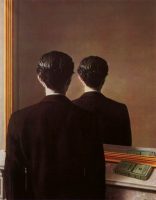
Mark Strand died this past weekend. His name is added to the recent list of poets we’ve lost in recent weeks including Jon Stallworthy, Galway Kinnell, Carolyn Kizer, and Dannie Abse. I didn’t know much about Strand outside of his work except that he was a student of Donald Justice, with whom he shared a subtle and restrained surrealistic poetic sensibility.
I can recall first encountering his poem “Keeping Things Whole” when I was in college, sometime around 1975. I had already been reading the works of Frost, Yevtushenko, Rimbaud, and others. But when I read that Strand poem the language emerged from a different room, one in which a fever dream-logic was activated, calmly and with authority and acceptance. I found it disturbing, provocative, and memorable. An early poem of his, it will likely be one of the poems by which Strand is remembered. So be it. He will be remembered.
KEEPING THINGS WHOLE
In a field
I am the absence
of field.
This is
always the case.
Wherever I am
I am what is missing.
When I walk
I part the air
and always
the air moves in
to fill the spaces
where my body's been.
We all have reasons
for moving.
I move
to keep things whole.
“When I read that Strand poem the language emerged from a different room, one in which a fever dream-logic was activated, calmly and with authority and acceptance.”